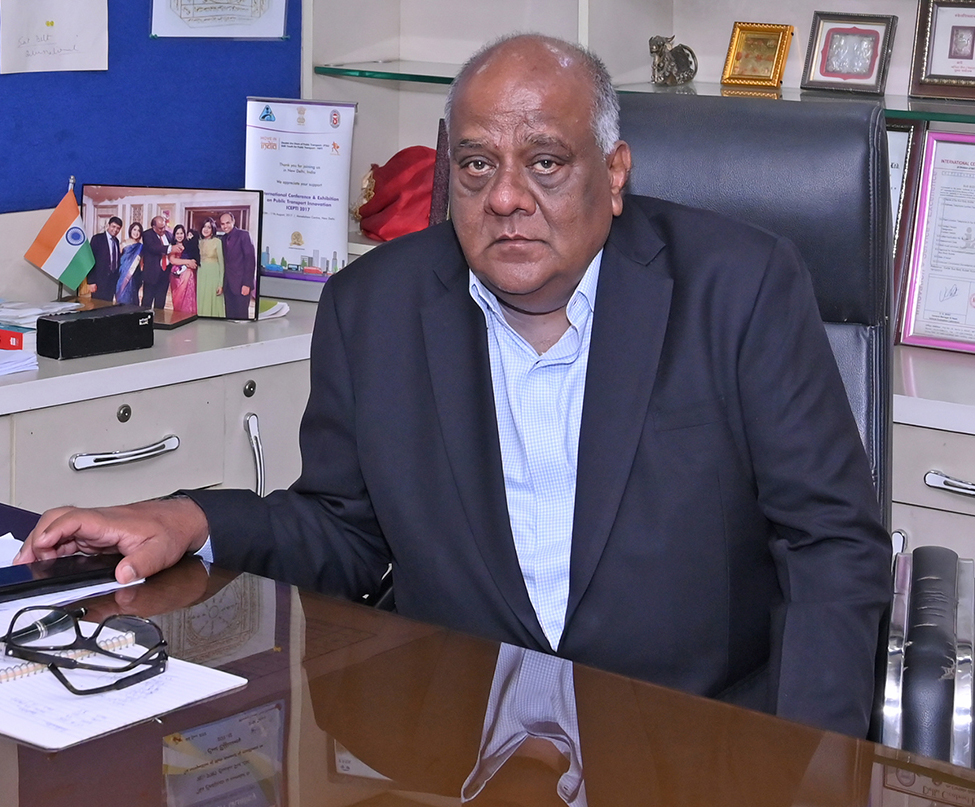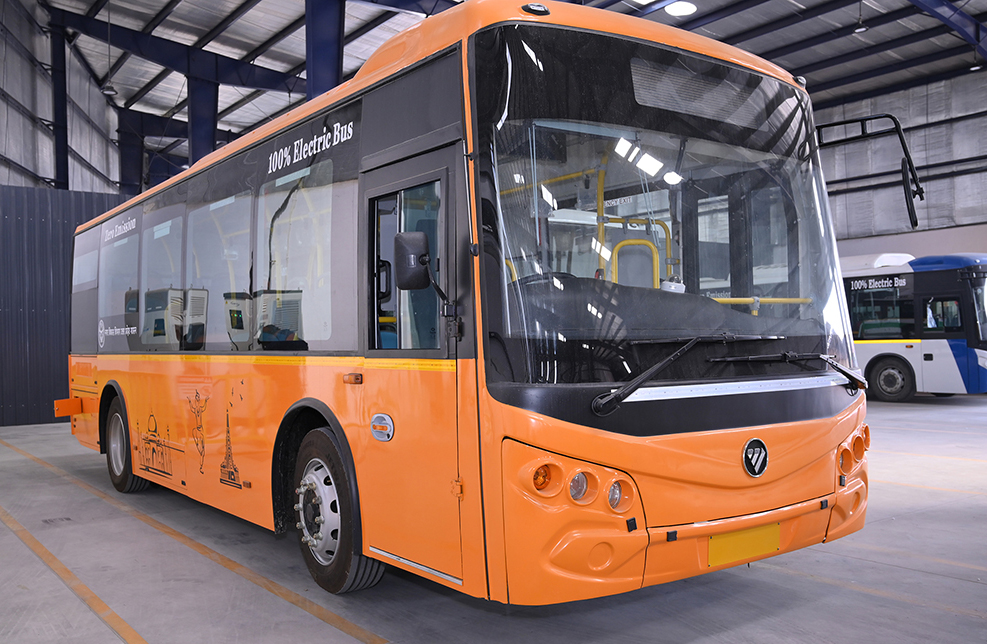
With the market for electric buses predicted to be worth more than a million units in the coming few years, supported by the initiatives of the Indian government, PMI Electro Mobility Solutions P Limited finds itself in an advantageous space and has already carved out ambitious plans to be a leader in the EV segment. N. Balasubramanian finds out more from Satish Jain, PMI Chairman
Let’s start by understanding the ownership structure of PMI Electro Mobility Solutions P Limited (PMI) right now. Post the investment by GreenCell Mobility, what stake does each party have in PMI at present? Do we see this changing in the near to mid-term future?
PMI is a 100% Indian promoter-led company held by PMI Coaches Private Limited with me as the main promoter. Greencell Mobility (GCM) has invested in the SPV which has undertaken UP projects. GCM has no stake in PMI directly. We might experience a change in the structure in case we are able to find a potential partner who is ready to work in partnership with PMI towards its growth plan.
What is the product range that PMI offers at present?
PMI currently manufactures and operates electric buses in 7-metre, 9-metre and 12-metre categories. And while our portfolio includes a healthy blend of the three categories, our fast selling product is the 9-metre electric bus. In these variants also PMI does all kinds of combinations, including low floor, BRT, etc.
Electric vehicles are well and truly here and India seems to be in the middle of a huge transition as far as EV adoption is concerned. Given the fact that buses, especially intra-city ones, are among the first movers in the EV space, what potential does PMI see in this segment? On a realistic note, what kind of market size in terms of number of units are you looking at and what share of the same is PMI targeting?
The company is expecting the market for electric buses to be worth more than a million units in the coming few years. The Government of India and the different state governments, on average, add around 90,000 to 1 lakh new buses to their fleets every year and we expect that majority of electric bus orders will come from different governments over the next five years. Our order book already contains more than 1,300 electric buses, and we anticipate receiving further orders from the FAME II programme run by the Indian Government.
We believe that the market for private electric buses has enormous untapped potential. In India, several airports are serviced by thousands of diesel and CNG-powered buses. In addition, there is a market for buses used in schools and colleges, followed by the business and travel sector. We are researching to see how we can help the market for school buses and college buses. We will be introducing an e-bus designed just for schools that will be priced affordably.
How many electric buses have you sold or bagged orders for? Which are the states or cities where we can see PMI e-buses plying? How does the roadmap look like for the rest of the financial year in terms of new orders and geographies within India that will adopt your buses?
Our order book currently stands at over 1,300 e-buses and we have recently been awarded LOAs in several states in the country. Currently, we have around 603 electric buses running in India in over 20 cities, including Mangalore, Rajkot, Shimla, Lucknow, Kanpur, Agra, and Ladakh, among others. As mentioned, we have received new LOAs and will be aggressively bidding for tenders floated by various STUs to increase our presence in the country and help make the public transportation cleaner.
Where are your electric buses manufactured? What percent of the components that go into your vehicles are locally sourced? Given the fact that the EV component space has both reliable quality suppliers and also cheap poor quality ones, how do you ensure that critical components that go into your buses are the best and can be trusted for the entire lifecycle of the vehicle?
PMI is a ‘Make in India’ company and our buses feature high levels of localisation. We have our manufacturing facility in Dharuhera, Haryana where we build our buses. We also have a battery pack unit in Dharuhera where batteries are locally assembled. We source most of the components locally from reputed and trusted vendors. Our extensive research and development team helps us ensure that we use advanced technology for our buses. We also have detailed testing and validation processes that include over 1,000 checks to ensure reliable vehicles. As a result of these stringent testing processes, none of our electric buses has encountered a breakdown so far.
Could you tell us about the new electric CV manufacturing plant for which you had recently laid the foundation stone? What products will you produce there and at what initial production capacity? How confident are you about the potential in the electric cargo vehicle (goods transport) space and also what gives you the confidence to believe you will succeed in the segment which is seeing quite a stiff competition from both established brands and aggressive start-ups?
We set the foundation stone for a new electric CV manufacturing facility in Chakan, Maharashtra, with an annual production capacity of 2,500 vehicles. The 35-acre plant, which is going to be built at MIDC Chakan, would employ 1,500 people. The upcoming facility’s strategic location provides it with access to the Nhava-Sheva port as well as the supply chain ecosystem in Pune. This provides it with the logistical advantage to cater to the major markets in the western, central, and southern parts of the country, including Maharashtra, Gujarat, Karnataka and Madhya Pradesh, amongst others. Furthermore, the facility, for which the foundation stone was placed, will comply with all green construction regulations and be ready for use by August 2023 at the latest.
Our total annual production capacity will increase to 4,000 electric commercial vehicles once the new facility in Pune is operational. Additionally, the new factory will be able to produce electric commercial vehicles for various segments. With the opening of the Pune manufacturing plant, we will be able to proudly set the groundwork for the subsequent stage of our company’s expansion. This will bring us one step closer to realising our aim of being a prominent player in the global market for electric commercial vehicles while also contributing to the initiatives of ‘Made in India’ and ‘Make for India’. Currently, there are around 10 OEMs in the e-bus space and PMI has emerged as one of the fastest-growing electric commercial vehicle manufacturers in the country.
Our focus on technology and safety has helped us evolve as one of the most trusted e-bus brands in the country and we are committed to making technologically advanced EVs that include high levels of localisation and modern technology. Unlike some of our rivals, we do not focus on winning large tenders but instead bid for smaller ones so that we can ensure a quick turnaround time for delivering e-buses. Along with that, a key area of our focus is to successfully run and maintain the electric buses delivered by us. This strategy has helped PMI expand its footprint in the country and we are currently leading the electric bus charge in states such as Uttar Pradesh.

Safety and charging infrastructure are probably two of the main concerns in people’s minds when it comes to usage of EVs. How is PMI getting these two critical aspects covered so that customers and end-users (passengers) get the necessary confidence to switch to electric buses?
The EV space in India has grown exponentially over the last few years. However, we are limited by resources and technology in India and many OEMs have taken a shortcut by importing low-quality products from China. PMI, on the other hand, invests significantly in research and development and uses only reliable and safe technology for its buses. We have over 1,000 testing and validation processes to ensure that each PMI bus is technically robust and safe. Besides stressing on vehicle safety, PMI is also one of the few e-bus makers that lay great emphasis on passenger safety. Our buses are equipped with CCTV cameras and RTMS (real-time monitoring system). The RTMS collects a variety of vehicle data in real-time and helps us pre-emptively address potential issues, if any. As a result of this, our buses have not witnessed even a single breakdown despite having covered over 1.25 crore green kilometres in India.
What are PMI’s medium to long-term plans? India is the second-largest bus market in the world and we also have two players in the top 10 in the world in bus production, along with competitors from Europe and China. What position are you gunning for in due course of time and what will be your strategy to achieve the same? Could you also share your financial targets for the coming years?
PMI plans to maintain its position to be a leading zero emission commercial vehicle manufacturer. We at PMI focus on delivering the best quality products and provide robust after-sales service to the customer for which we have young and dynamic teams across the country.
We are, in the near future, planning to expand our portfolio and add new products in the commercial vehicle space. With private demand rising gradually, the adoption of EVs will become faster. This year PMI closed its books at approximately Rs. 400 crore and with the current order book in hand we are targeting to close our books at around Rs. 800 crore next year.